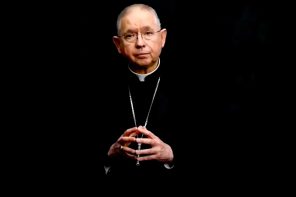SEATTLE – Members of Washington United for Marriage, the coalition working to keep the state’s new gay marriage law on the books by coaxing voters to approve Referendum 74 this fall, have a clear mission: to move people of faith.
Four years ago, they watched in horror and disbelief as California’s marriage equality law was repealed by Proposition 8, aided by the money of religious conservatives, much of which came from outside the state. Washington could go the same way, now that its February law has been stalled by the successful referendum petition circulated by churches, endorsed by the Catholic bishops, and helmed by Joseph Backholm, a prominent evangelical Christian.
But R-74 supporters have no intention of watching history repeat itself. Organizers have spent months cultivating relationships with the state’s Faith Action Network and new chapters of Catholics for Marriage Equality and Mormons for Marriage Equality. Both groups marched in Seattle’s Pride Parade last Sunday, and had representatives at the coalition’s first “people of faith” phone bank on Tuesday.
Religious volunteers, they believe, can sway values voters by sharing personal stories about their own faith journeys toward supporting marriage equality, gay relatives and friends, explained Andy Grow, Washington United for Marriage press secretary.
“In California, they talked a lot about rights, and they didn’t talk enough about what this means for couples, for people who love each other,” he said. “Faith communities are not monolithic, and we have a huge swatch of Christian denominations working with us now.”
Discussions during the phone bank covered the Golden Rule, whether the Leviticus view of homosexuality as an abomination also extended to eating shrimp, and how civil marriage licenses are distinct from religious weddings. Most of the calls lasted mere seconds, with people not home or not interested.
After an hour working the phones, Scott Holley, 33, cheerfully noted that he had become “unfazed by rejection” during his two-year Mormon mission in Chile.
“There are people out there that are ready to hear your message. You just have to find them,” he said, of both experiences. “There are people who have been preparing to become accepting, and it’s now time to harvest.”
In his own faith community, a bisexual relative and a gay college friend have stopped attending Church of Jesus Christ of Latter-day Saints gatherings because they feel rejected by its stance against homosexuality. But that can’t be what a loving God wants, Holley believes. And as a Mormon, he’s particularly adept at assuring voters that gay marriage won’t lead to polygamy.
A few phones over, Howard Heller, 58, of Burien, enthusiastically told voters about his own “selfish” reason for wanting R-74 approved: so that he may legally wed Carla Robinson, whose Ohio birth certificate can’t be amended to reflect that she changed genders as an adult.
“We would like to get married, but the only way we can right now is if I change my gender, and I’m not throwing a bouquet,” he said, with a chuckle.
His fiancée, an Episcopal vicar, made an “It Gets Better” video:
But will it? If Referendum 74 passes, their state will become the first to approve same-sex marriage by popular vote. Washington United for Marriage has phone banks scheduled until November, with at least four more dedicated “people of faith” nights to make their case.




